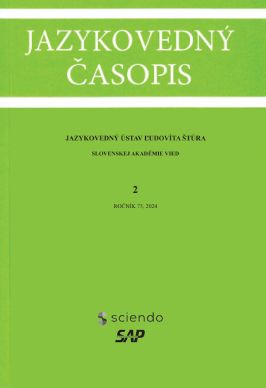Notes on the semantic development of Old Church Slavic nravъ and rovaniję
DOI:
https://doi.org/10.2478/jazcas-2024-0034Kľúčové slová:
etymology, moral words, Old Church Slavic, semantic change, semantics, Slavic languagesAbstrakt
The aim of this paper is to analyse Old Church Slavic nravъ ‘nature, character’ and rovaniję ‘gifts’. As the meanings of the words from Proto-Indo-European *(H)nōrH- point out, Proto-Slavic *norvъ, from which Old Church Slavic nravъ derives, had a semantics similar to that pervasive in Latin mōrōsus ‘hard to please’ or ‘qui suit son humeur, difficile, capricieux, chagrin’. In the Old Church Slavic period, however, the word nravъ ‘manner, custom’ had a neutral connotation, like Latin mōs ‘custom, usage’. As for the word-form rovaniję, it originated in a period when gifts and taxes were distinguished. Taxes were given (*da-nь ‘tax’, *da-rъ ‘gift’ < *da-ti ‘give’), offered first to pagan deities and then to the Christian God. They were also brought as (voluntary) gifts to Slavic princes. According to the etymology of rov-aniję < *rov-ati ‘to make a notch, cut; to determine the amount of a fee (tax/gift)’, nevertheless, they were written down (or prescribed) in the Old Church Slavic period in Great Moravia.
Sťahovanie
Publikované
Číslo
Rubrika
Licencia
Copyright (c) 2025 Martin Diweg-Pukanec
Táto práca je licencovaná pod Medzinárodnou licenciou Creative Commons Attribution-NonCommercial-NoDerivatives 4.0.


